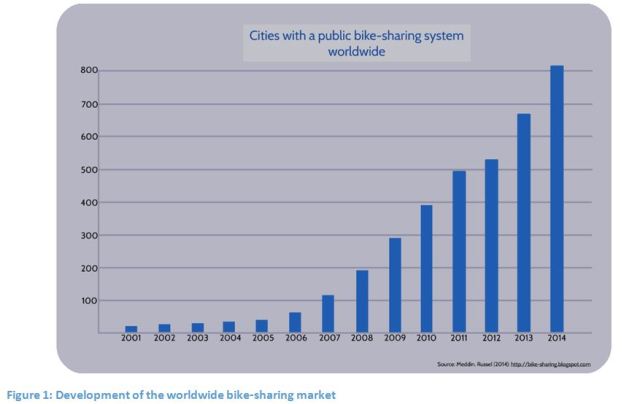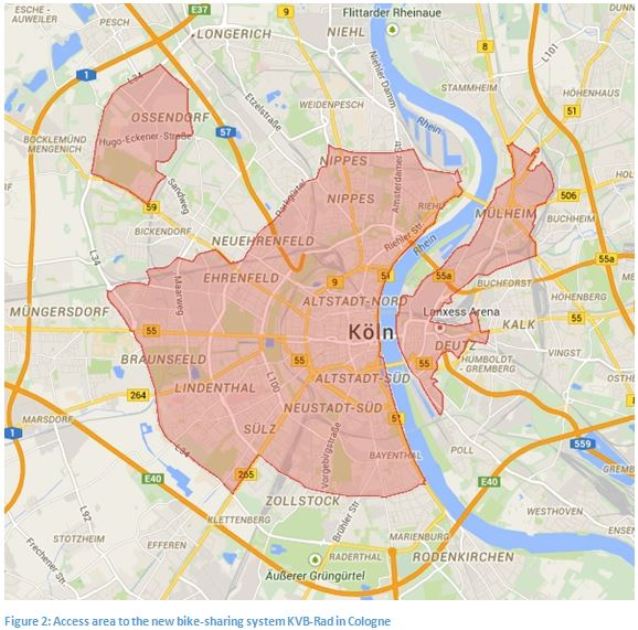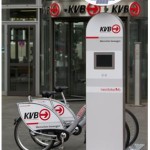
800 cities, 1 million bicycles in bike sharing worldwide
Bike sharing is almost exponentially growing around the world, public transit companies increasingly use these systems to tackle problems with motorized transport. Cities and companies are now turning more and more to solutions which are smartphone based.
Bike sharing combines a 19th century vehicle with the information technology of the 21st century and has become increasingly relevant for first / last-mile connectivity within urban mobility networks. Within a short decade bike sharing has mushroomed in more than 800 cities world-wide with approximately 1 million bicycles available.
 Nextbike
Nextbike
Obviously there are some key advantages for customers and cites: bicycles which are publicly available and easily accessible make a public transport system more attractive. In smaller cities where public transport is not as frequent and dense bike-sharing enables a greater accessibility and shorter travel times. In large metropolitan areas, however, it helps to calm peak hours in traffic. Bike-sharing is also the most flexible and individual mode of public transport.
Consequently public-transport companies and authorities appreciate the value of bike sharing systems as part of their mobility portfolio to tackle the problems related to individual motorized transport. The following example for a potentially benchmarking system has been developed by the public transport provider of Cologne (KVB) in cooperation with nextbike.
By the end of March a hybrid bike-sharing system will be installed consisting of 900 smart bikes (phase 1). The map below shows the area where the bicycles will be available.
 Nextbike
Nextbike
In some parts of the city it will be possible to leave the bicycles at every intersection (free floating zone) whereas in other parts it is only possible to rent and return the bicycles at official bike sharing stations with touch screen terminals.
 Nextbike
Nextbike
In order to allow seamless travel chains all subscribers for public transport can use their e-ticket to access the bicycles. Additionally, they will be able to ride the bicycles per rental 30min free-of-charge without a separate registration at nextbike. Due to the integrated board-computers it will be possible to access a bicycle by holding the KVB e-ticket on the card reader.
In this way the new nextbike system is perfectly integrated in the existing public transport network of Cologne.
Also, the example of Cologne shows that the integration between different public transport modes using an NFC (near field communication) based smart-card is a pragmatic and convenient solution. Some countries like the Netherlands (OV-Chipkaart), Denmark (Rejsekort) or Switzerland (SwissPass from June 2015) installed these systems even nationwide.
There is, however, a trend observable that more and more customers are looking for solutions which are smartphone based. In Denmark for instance, 30 percent of the public transport tickets are already purchased via a smartphone application. Therefore, smartphones supporting NFC-technology will most probably replace smartcards in the long term. The KVB bike-sharing system will be already prepared for this future direction.
About the author
 Dennis Steinsiek is a passionate cyclist working at nextbike as a mobility consultant since 2014. He also worked in Copenhagen for Mikael Colville Andersen at Copenhagenize Design Company. At nextbike he is particularly working on cooperations with public transport companies and universities. The goal is to establish a better connection between bicycles and public transport. He is based in Leipzig.
Dennis Steinsiek is a passionate cyclist working at nextbike as a mobility consultant since 2014. He also worked in Copenhagen for Mikael Colville Andersen at Copenhagenize Design Company. At nextbike he is particularly working on cooperations with public transport companies and universities. The goal is to establish a better connection between bicycles and public transport. He is based in Leipzig.
- Log in to post comments
Contact the author
Recent news!
Upcoming events
Contact Us
Avenue des Arts, 7-8
Postal address: Rue de la Charité, 22
1210 Brussels, Belgium









